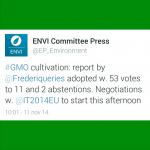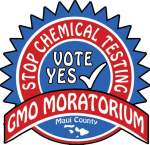Articles
12.11.2014 | permalink
Living with GMOs A Letter from America

Susan Sarandon
Actor
“We’ve had GMOs in the US for nearly 20 years. Instead of bringing certainty and security they have raised more and more worrying questions about their effectiveness, their necessity, and even their safety. Polls show that the majority of US citizens – and in fact citizens everywhere – either want them labelled or taken out of the food system altogether. It’s important to keep pressing our elected representatives to act in accordance with this strong public mandate.”
Mariel Hemingway
Actor and author
“There are major concerns about the short and long term impacts of GMOs on human and animal health. I’m very concerned about any food I put into my body, and I wouldn’t want to ingest something if I didn’t know where it came from. The fact that Monsanto is spending so much money to make sure GMOs are not labeled and to keep people uninformed should make everyone concerned about the impact GMOs can have on our bodies.”
11.11.2014 | permalink
No must mean no, as MEPs vote to strengthen GMO opt-outs for member states and regions

The European Parliament's environment committee today voted on a proposal for a new scheme for the authorisation of genetically-modified organisms in the EU. The vote by MEPs strengthens the grounds on which member states or regions could opt-out from GMO authorisations under the proposed new system. After the vote, Green food safety spokesperson Bart Staes said:
“MEPs have today voted to strengthen the hand of member states or regions wanting to opt-out of EU authorisations of GMOs, under a proposed new scheme, even if major concerns remain about the overall proposal. No must mean no: countries wanting to opt out of GM authorisations must have a totally legally watertight framework for doing so. However, the Greens are still very concerned that this new opt-out scheme is a slippery slope for easing EU GMO authorisations and does not fundamentally change the flawed EU approval process in itself.
Today's vote would offer much greater certainty by allowing opt-outs on the basis of environmental grounds complementary to the ones assessed by the European Food Safety Authority, something that was rejected by EU governments in Council. MEPs have also voted for the inclusion of mandatory measures to prevent the contamination of non-GM crops, with the myriad of issues this raises. The committee also rejected a proposal from EU governments, which would have obliged member states to directly request that corporations take them out of the scope of their GMO applications, before being allowed to opt out."
- Greens: "No must mean no", as MEPs vote to strengthen GMO opt-outs for member states and regions (11.11.14)
- GMO cultivation restrictions: committee vote 11.11.14
- Parliament votes to give European countries legally solid right to ban GM cultivation | Greenpeace EU Unit
- Real rights to ban GMOs a step closer | Friends of the Earth Europe
- IFOAM welcomes Parliament's vote on National GMO bans | Agricultural and Rural Convention
- MEPs reject compromise on GM crops | European Voice
- MEPs vote to firm up national bans on GM crops in Europe | Environment | theguardian.com
10.11.2014 | permalink
A Maui County ballot initiative to temporarily ban GMO crops passed

A Maui County Genetically Modified Organism Moratorium Initiative ballot question was on the November 4, 2014 election ballot for voters in Maui County, Hawaii, where it was approved.
The measure was designed to prohibit any growth, testing or cultivation of genetically modified or engineered crops and put a stop to any genetic modification and engineering operations in the county until an environmental and public health study is conducted and finds the proposed cultivation practices to be safe and harmless. This measure was the first ever initiative attempt in Maui County, where the initiative power was granted through its charter in 1983.
Proponents reported overwhelmingly positive responses from the Maui voters, collecting their first batch of signatures in less than six weeks, while they were allowed 6 months by law.
07.11.2014 | permalink
MON810: Suspected manipulation in the outcome of EU research

Testbiotech: Evaluation of data from feeding trial with genetically engineered maize MON810 indicates negative health impact in rats.
Friday, 7. November 2014
Testbiotech has today published an independent evaluation of data from feeding trials with rats that were conducted under the GRACE project funded by the EU Commission. The rats were fed over a period of 90 days with genetically engineered maize MON810, which produces an insecticidal protein. The results were published in October 2014 in the journal Archives of Toxicology. The authors conclude that there were no relevant observable toxicological effects. However, an evaluation by Testbiotech has now revealed indications of negative health impacts on kidneys, liver and pancreas. Furthermore, the failure in this study to determine a concentration of MON810 at which there were no observable toxic effects, makes the entire study more or less invalid. For the evaluation of the data, additional external expertise was made available by a toxicologist with long-term experience in regulatory toxicology.
Testbiotech also criticizes the authors purposely published the results of the study in a scientific journal with close affiliation to industry.
- Suspected manipulation in the outcome of EU research project | testbiotech
- EU research project GRACE publishes first study findings - GRACE FP7
- EU project seeks to improve GM food safety testing
- Current ILSI Europe Members
- MON-ØØ81Ø-6: EU register of genetically modified food and feed
- Testbiotech Comments regarding the GRACE publication "Ninety-day oral toxicity studies on two genetically modified maize MON810 varieties in Wistar Han RCC rats (EU 7th Framework Programme project GRACE)"
05.11.2014 | permalink
Will GMO Free Be The New Organic?
For the most part, the war over GMOs is at a resting place. The anti-GMO forces have won the culture wars with a kind of aesthetic distaste for the technology, blocking its success in consumer-visible forms. That is why there is no Flavr Savr tomato anymore.
03.11.2014 | permalink
India: Activists oppose GM maize trials in Maharashtra
The Coalition for a GM-Free India, a group of about 400 organisations, has sought an explanation from the Mahatma Phule Krishi Vidyapeeth at Rahuri on why it is conducting controversial open field trials of genetically modified corn on its campus.
03.11.2014 | permalink
Germany: Edeka leads first own-brand with label

Start with GOOD & CHEAP chicken products at regional level Label "GMO-Free" provides clear guidance for consumers Edeka Center is a partner of the federation "foods without genetic engineering"Hamburg, 11.03.2014. Edeka has introduced the first own-brand with the label "GMO-Free". Various chicken products with private label GOOD & CHEAP since October are available in many markets in the southwest and southeast of Germany. The GOOD & CHEAP chicken products are currently sold in the regions of Southwest (Baden-Württemberg, Rhineland Palatinate, Saarland and parts of Hesse), and in northern Bavaria, Saxony and Thuringia.
- EDEKA führt erste Eigenmarken mit Siegel "Ohne Gentechnik" ein
- Germany set to see more widespread use of GM free soy label in coming months
- ProTerra Foundation Executive Director, Sibyl Anwander
- Ohne Gentechnik
- Gen Burger Unerwuenscht
- Label-Suche | LABEL-ONLINE - Das Portal mit Informationen und Bewertungen zu Labeln in Deutschland
28.10.2014 | permalink
CBD Asks for Regulation on Synthetic Biology
In a unanimous decision of 194 countries, the United Nation’s Convention on Biological Diversity (CBD) today formally urged nation states to regulate synthetic biology (SynBio), a new extreme form of genetic engineering.
23.10.2014 | permalink
Patents on plants and animals a threat to food sovereignty, new report warns

The European Patent Office (EPO) has already granted several thousand patents on plants and seeds, with an increasing number of patents on plants and seeds derived from conventional breeding, according to a new report published by the international coalition “No Patents on Seeds!” If politicians don’t ensure that these kind of patents are prohibited, our daily food will soon be controlled by big corporations and the patent industry, the report warns. Since the 1980s, around 2400 patents on plants and 1400 patents on animals have been granted in Europe. The EPO has granted more than 120 patents on conventional breeding and about 1000 such patent applications are pending. The scope of many of these patents often covers the whole food chain from production to consumption. The report gives an overview of patents granted in 2013 and early 2014, including a patent on conventionally bred peppers derived from wild, insect-resistant varieties from Jamaica. The patent granted to Syngenta covers the plants, fruits and seeds and even claims the growing and harvesting of the plants as an invention. The EPO also granted a patent to Monsanto on screening and selecting soybean plants adapted to certain climate zones, concerning wild relatives of soybeans found in Asia and Australia. This gives Monsanto a monopoly on the future usage of hundreds of natural DNA sequence variations in the conventional breeding of soybeans. “Industry together with the EPO is the driving factors turning the patent system into an instrument for misappropriation of basic resources needed to produce our daily food. They are selling out the future of our food”, warns Christoph Then, one of the authors of the report. According to European patent law, plant and animal varieties as well as conventional methods of plant and animal breeding cannot be patented. With its decision, the EPO has “intentionally created a situation full of legal absurdities that allows prohibitions to be circumvented”, serving the interests of multinationals such as Monsanto, Dupont and Syngenta who already control more than 50% of the international commercial seed market.
22.10.2014 | permalink
New Review: Not Enough Evidence that GM Crops are Safe to Eat
A recently published review by researchers at two universities has suggested that there is not enough evidence that GM crops are safe to eat.
